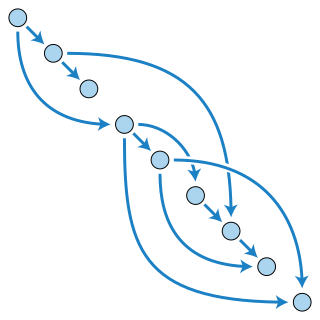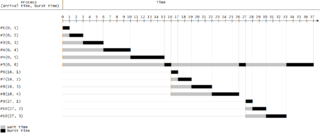A real-time operating system (RTOS) is any operating system (OS) intended to serve real-time applications that process data as it comes in, typically without buffer delays. Processing time requirements are measured in tenths of seconds or shorter increments of time.
A real time system is a time bound system which has well defined fixed time constraints. Processing must be done within the defined constraints or the system will fail.
They either are event driven or time sharing. Event driven systems switch between tasks based on their priorities while time sharing systems switch the task based on clock interrupts. Most RTOS’s use a pre-emptive scheduling algorithm.

Atropos or Aisa, in Greek mythology, was one of the three Moirai, goddesses of fate and destiny. Her Roman equivalent was Morta.

In mathematics, particularly graph theory, and computer science, a directed acyclic graph, is a finite directed graph with no directed cycles. That is, it consists of finitely many vertices and edges, with each edge directed from one vertex to another, such that there is no way to start at any vertex v and follow a consistently-directed sequence of edges that eventually loops back to v again. Equivalently, a DAG is a directed graph that has a topological ordering, a sequence of the vertices such that every edge is directed from earlier to later in the sequence.
In computing, scheduling is the method by which work specified by some means is assigned to resources that complete the work. The work may be virtual computation elements such as threads, processes or data flows, which are in turn scheduled onto hardware resources such as processors, network links or expansion cards.
In computer science, rate-monotonic scheduling (RMS) is a priority assignment algorithm used in real-time operating systems (RTOS) with a static-priority scheduling class. The static priorities are assigned according to the cycle duration of the job, so a shorter cycle duration results in a higher job priority.

Round-robin (RR) is one of the algorithms employed by process and network schedulers in computing.
As the term is generally used, time slices are assigned to each process in equal portions and in circular order, handling all processes without priority. Round-robin scheduling is simple, easy to implement, and starvation-free. Round-robin scheduling can also be applied to other scheduling problems, such as data packet scheduling in computer networks. It is an operating system concept.
In economics, resource allocation is the assignment of available resources to various uses. In the context of an entire economy, resources can be allocated by various means, such as markets or central planning.
Tomasulo’s algorithm is a computer architecture hardware algorithm for dynamic scheduling of instructions that allows out-of-order execution and enables more efficient use of multiple execution units. It was developed by Robert Tomasulo at IBM in 1967 and was first implemented in the IBM System/360 Model 91’s floating point unit.
In computer science, resource starvation is a problem encountered in concurrent computing where a process is perpetually denied necessary resources to process its work. Starvation may be caused by errors in a scheduling or mutual exclusion algorithm, but can also be caused by resource leaks, and can be intentionally caused via a denial-of-service attack such as a fork bomb.

Insomnia is a horror/fantasy novel by American writer Stephen King, first published in 1994. Like It and Dreamcatcher, its setting is the fictional town of Derry, Maine. The original hardcover edition was issued with dust jackets in two complementary designs. The first is pictured on the right; the second has the white and red colors reversed. In his memoir, On Writing, King states that Insomnia and Rose Madder are "stiff, trying-too-hard novels."

The name death's-head hawkmoth refers to any of three moth species of the genus Acherontia. The former species is found primarily in Europe, the latter two are Asian; most uses of the common name refer to the European species. These moths are easily distinguishable by the vaguely human skull-shaped pattern of markings on the thorax. All three species are fairly similar in size, coloration and life cycle.
In computer science, a topological sort or topological ordering of a directed graph is a linear ordering of its vertices such that for every directed edge uv from vertex u to vertex v, u comes before v in the ordering. For instance, the vertices of the graph may represent tasks to be performed, and the edges may represent constraints that one task must be performed before another; in this application, a topological ordering is just a valid sequence for the tasks. A topological ordering is possible if and only if the graph has no directed cycles, that is, if it is a directed acyclic graph (DAG). Any DAG has at least one topological ordering, and algorithms are known for constructing a topological ordering of any DAG in linear time.

An O(1) scheduler is a kernel scheduling design that can schedule processes within a constant amount of time, regardless of how many processes are running on the operating system. This is an improvement over previously used O(n) schedulers, which schedule processes in an amount of time that scales linearly based on the amounts of inputs.

Lachesis, in ancient Greek religion, was the second of the Three Fates, or Moirai: Clotho, Lachesis and Atropos. Normally seen clothed in white, Lachesis is the measurer of the thread spun on Clotho's spindle, and in some texts, determines Destiny, or thread of life. Her Roman equivalent was Decima. Lachesis was the apportioner, deciding how much time for life was to be allowed for each person or being. She measured the thread of life with her rod. She is also said to choose a person's destiny after a thread was measured. In mythology, it is said that she appears with her sisters within three days of a baby's birth to decide its fate.
In computer science, a multilevel feedback queue is a scheduling algorithm. Solaris 2.6 Time-Sharing (TS) scheduler implements this algorithm. The MacOS and Microsoft Windows schedulers can both be regarded as examples of the broader class of multilevel feedback queue schedulers.
This scheduling algorithm is intended to meet the following design requirements for multimode systems:
- Give preference to short jobs.
- Give preference to I/O bound processes.
- Separate processes into categories based on their need for the processor.

Shortest job next (SJN), also known as shortest job first (SJF) or shortest process next (SPN), is a scheduling policy that selects for execution the waiting process with the smallest execution time. SJN is a non-preemptive algorithm. Shortest remaining time is a preemptive variant of SJN.

Shortest remaining time, also known as shortest remaining time first (SRTF), is a scheduling method that is a preemptive version of shortest job next scheduling. In this scheduling algorithm, the process with the smallest amount of time remaining until completion is selected to execute. Since the currently executing process is the one with the shortest amount of time remaining by definition, and since that time should only reduce as execution progresses, processes will always run until they complete or a new process is added that requires a smaller amount of time.

Acherontia atropos, the (African) death's-head hawkmoth, is the most widely recognized of three species within the genus Acherontia. It is most commonly identified by the vaguely skull-shaped pattern adorning the thorax, the characteristic from which its common and scientific names are derived. The species was first given its scientific name by Carl Linnaeus in his 1758 10th edition of Systema Naturae.

The Completely Fair Scheduler (CFS) is a process scheduler which was merged into the 2.6.23 release of the Linux kernel and is the default scheduler. It handles CPU resource allocation for executing processes, and aims to maximize overall CPU utilization while also maximizing interactive performance.
Job shop scheduling or the job-shop problem (JSP) is an optimization problem in computer science and operations research in which jobs are assigned to resources at particular times. The most basic version is as follows: We are given n jobs J1, J2, ..., Jn of varying processing times, which need to be scheduled on m machines with varying processing power, while trying to minimize the makespan. The makespan is the total length of the schedule.











